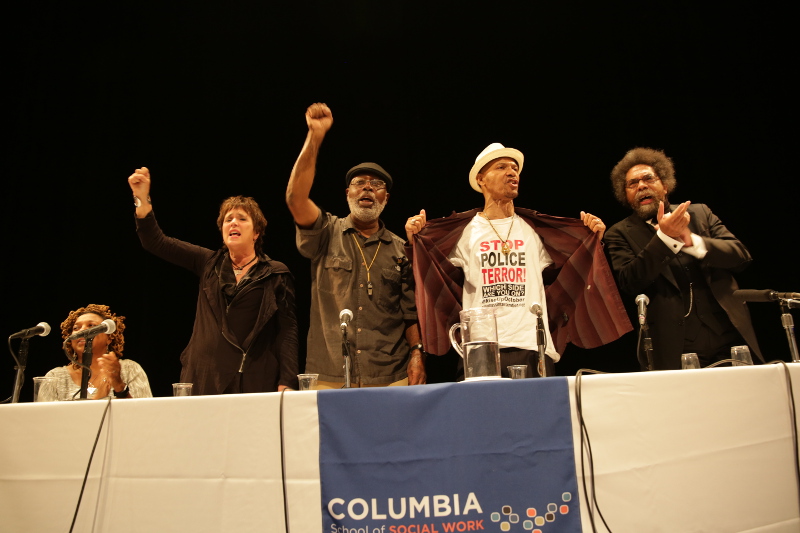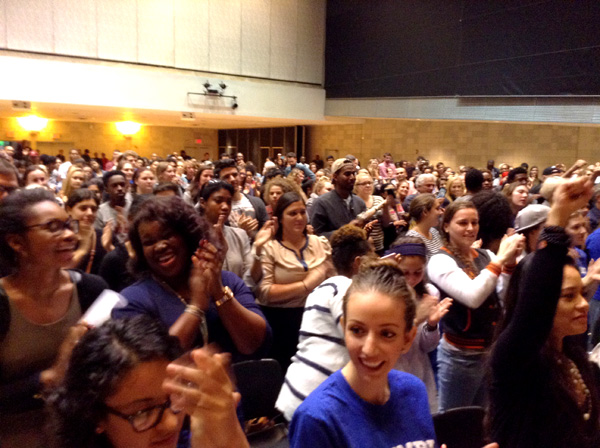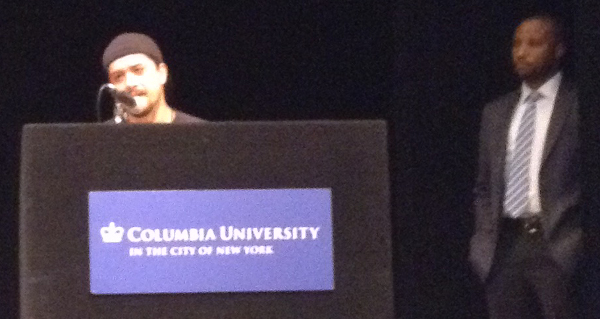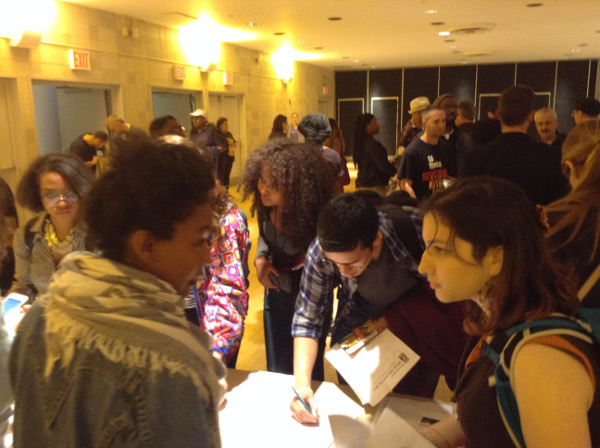550 Pack Columbia University Auditorium for Rise Up October
A Challenge to Columbia University Students and the World
October 8, 2015 | Revolution Newspaper | revcom.us

Kimberlé Crenshaw, Eve Ensler, Carl Dix, Nicholas Heyward, Sr., and Cornel West at Columbia University, October 7. (This photo was taken after Jamal Joseph, who was the first speaker of the evening, had to leave for another speaking engagement.) Photo: Alex Seel
After a down-to-the-wire battle to hold the event, 550 people, largely Columbia University students, packed the Lerner Hall Auditorium on the Columbia campus in NYC on Wednesday night, October 7, for a powerful, moving event challenging everyone to take up and organize for Rise Up October.
Columbia’s moves to deny an appropriate space for the event were turned around when students refused to back down, took the battle to the people, and enlisted wider support for the event—and this struggle actually strengthened people’s understanding of the importance of the event, the stakes of the struggle to end police terror, and the importance of Rise Up October.
A student in the Columbia School of Social Work talked to Revolution about what students went through in fighting for a venue, and the changes they went through themselves to make that happen. They had to reach out way beyond the initial core of organizers—to the School of Law, to other colleges at Columbia, to Barnard (a traditionally women’s college affiliated with Columbia). She said, “This is how it happened: We raised more awareness. It had to get political. And we got it. It was a lot of student-led advocating, and we don’t often do that but this time we had to. And there needs to be more of that.” And she emphasized: “It doesn’t stop here. This event has to happen because on October 24, it’s gonna be a broader scale, we’re gonna shut down New York City to raise awareness for all those affected by police brutality. So it goes beyond here. …This is continuing for the month of October.”
* * *

The event was sponsored by the Columbia University School of Social Work caucuses: Latina/o caucus, Black caucus, Policy caucus, Education caucus, Criminal Justice caucus.

Noche Diaz (left) and Nkosi Anderson (right).

Getting organized. Photos: revcom.us
Featured speakers were Jamal Joseph, Eve Ensler, Nicholas Heyward, Sr., Kimberlé Crenshaw, Carl Dix, and Cornel West. The atmosphere was electric and determined. And the event marked an important step to build on to make Rise Up October a game-changing event in the battle to STOP POLICE TERROR.
Jamal Joseph—one of the Panther 21 and currently professor in the graduate film program at Columbia—opened the evening up with a challenge: Rise Up October! He saluted the students in the School of Social Work who had waged a struggle with the administration to be able to have a major venue for this event.
Jamal Joseph talked about being on the Columbia campus as a youth with the Black Panther Party, during an anti-war protest in the 1960s: “What we witnessed… was the power of the people, what we understood about those gatherings in those moments—and a big round of applause for the students on the committee and the School of Social Work—is that the University recognize that this is something to open the doors to, because you cannot turn back a moment when it is time for liberation and truth-telling and progressive change. Our job tonight is to witness and act on that.”
He posed: “For the people on the front lines, here’s what this must mean, and here’s why a gathering like tonight at Columbia University is important—and the other places we have been—churches, the community, other schools—it’s important because we are looking into the faces of the people, we are understanding the power of the people. And what must happen in Rise Up October is that we have to get people out, so the powers of oppression know the next time they stop a Black or Brown boy or girl, that the next time they stop a poor person or a homeless person, the next time they harass them, they’re not just looking into the eyes of that one particular person, they’re looking into the eyes of all of us! [loud applause] That’s what the power of the people is. Yes we have to use social media, we have to reach people by any way we can, we have to canvass, but we’ve got to do that ground to say that at this point nothing is going to be more effective than to flood the streets so they can understand that this city and this country is rising up in October!”
Eve Ensler—V-Day; author, playwright: The Vagina Monologues—vividly, viscerally took the crowd into the room where Natasha McKenna, a Black woman, desperately in need of mental health care, was brutally degraded, assaulted and murdered by prison personnel. Seven of them, with hazmat suits and Tasers assaulting one naked woman who had told them, “You promised not to kill me.”
“They took their Tasers and zapped her naked body, over and over. Four times—50,000 shockwaves into her body! While they covered her head! It was Abu Ghraib all over. Covered her head! They wrestled her down, tied her to an electric chair, drove her outside, where she was probably already half dead. And you know what, nobody noticed. Because Natasha was not a real woman, she wasn’t a real person, she was a story, she was an idea. She was a racist projection in their minds. And I’m sorry, if we all in this country don’t understand that Natasha McKenna is our sister, she is our sister. That could have been anyone of our sisters. She’s our sister. We are part of that story that killed Natasha McKenna. And if we’re not on the streets October 24th and if you don’t bring every single person out, this police state will eventually come for all of you.”
Nicholas Heyward, Sr. courageously shared the excruciating pain of having his 13-year-old son, Nicholas, Jr, murdered by police—shot down in cold blood as he played with a brightly colored plastic toy gun: “He had already had his mind set on being a basketball player and a lawyer, all of which was within his reach, and then I had to have a coward-ass cop gun him down. The cop asked Nicholas, ‘What are you doing?’ Mind you—the cop asked him. And when Nicholas replied ‘We only playing, we only playing.’ And he shot and killed him anyway. What kind of society, what kind of system is this? Why is he still on the force? And why must we continue to fight this system that we know we not gonna get no justice under? Rise up October! Let’s show them we are tired of this and we are not taking it no more.”
Kimberlé Crenshaw—professor, UCLA and Columbia University School of Law, one of the initiators of the Say Her Name campaign—challenged the audience. She started by asking people to raise their hands if they recognized the names of Eric Garner, Mike Brown, Tamir Rice, Freddie Gray. Most people raised their hands. But then she continued with the name of women killed by police whose names are less widely known: Michelle Cusseaux, Tanisha Anderson, Maya Palmer, Aura Rosser, Kayla Moore. And she called on the audience to know their names, and SAY their names.
“Melissa Williams was killed along with the partner she was driving with in Cleveland, Ohio. The car backfired. Police mistook that for gunshots. Police chased them throughout Cleveland shooting 137 rounds. An officer ran up on the hood of the car, he alone fired 49 rounds. Said he was in fear of his life. You don’t go on the hood of a car when you’re afraid for your life. Melissa was killed instantly. When we Say Her Name, we need to say: Melissa Williams.”
And Kimberlé Crenshaw talked about how Black woman are killed by police in their homes when in desperate need of help, including “Tanisha Anderson, Black woman, Cleveland, Ohio. Killed a week before Tamir Rice. You don’t know her name. Same police force that killed Tamir killed her. What happened? Her family called because she was having a mental health crisis. The family called for help. Police arrived, decided they were going to take over the situation with coercive force, rather than treating her as a woman in need of help. Tried to put her in a police car, tried to put her in a confined situation, tried to separate her from her family. She resisted. They did a takedown move on her, threw her to the ground, on the cement in the dead of winter in Cleveland, Ohio. Her death ruled a homicide. You need to know Tanisha Anderson’s name! Say her name! Tanisha Anderson!”
Carl Dix—co-initiator of Rise Up October and a representative of the Revolutionary Communist Party (RCP)—shared heartfelt experiences working with families of those murdered by police. And he framed what he spoke to in a quote from Bob Avakian:
There is the potential for something of unprecedented beauty to arise out of unspeakable ugliness: Black people playing a crucial role in putting an end, at long last, to this system which has, for so long, not just exploited but dehumanized, terrorized and tormented them in a thousand ways—putting an end to this in the only way it can be done—by fighting to emancipate humanity, to put an end to the long night in which human society has been divided into masters and slaves, and the masses of humanity have been lashed, beaten, raped, slaughtered, shackled and shrouded in ignorance and misery.
Carl Dix talked about the ugliness: “All these horrors are completely unnecessary. Things don't have to be this way. We should live in a world where those entrusted with public security would sooner lose their own lives than kill or maim an innocent person.” And the problem: “It’s not just the way the police spread terror in Black and Latino communities. It’s also what was done to the native inhabitants of this land. This land was stolen from them. They were nearly wiped out. Those few who survived were put in concentration camps they call reservations. There is what is done to women in this society with its rape culture, with viewing women as sex objects, and with the interference of government authorities in the very private decisions around when and whether to have a child. There’s what’s done to our immigrant sisters and brothers, driven here by the devastation that the U.S. wreaks in their homelands and then arriving here to face persecution—deported by Obama in record numbers and insulted by fascist idiots like Donald Trump. And then there are the wars for empire—wars in which one million people were killed in Iraq in the past few decades and before that three million in Vietnam and before that in Korea…. I was in their military…when they told me I had to go to Vietnam to kill innocent people for them my answer was ‘Hell no, I ain’t goin’!’ And then there’s also the way they’re devastating the environment of the planet we live on.”
Watch the entire event here
He spoke to both what was revealed in the revolutionary upsurges of the sixties and the setbacks the movement for revolution was hit with over the past decades. And then he pointed out, “That’s where Bob Avakian comes in—he never gave up on the people and he never gave up on revolution. He went to work learning from the experience of revolution and from experience more broadly, and has developed a new synthesis of communism—an even more scientific understanding of the methods, goals, strategy and plan for making revolution and creating a new society. On the basis of this new synthesis, the party Avakian leads, the RCP, is building a movement for revolution. So I’m challenging everyone here, especially you young people—get into this revolution, get into Bob Avakian and what he’s brought forward about how to make revolution. Get with the movement for revolution the RCP is building. Keep your sights aimed on emancipating all of humanity.”
He posed a sharp challenge to the students, and the audience: “Don’t get sucked into framing what you're trying to do in the language and terms of the system or limiting yourself to working within the channels this system puts out there. We’ve seen this movie before, and the result is the whole genocidal situation we face right now—and yes, I said genocide.”
Carl called on everyone, wherever they were coming from, to resist, and to take up Rise Up October and make it happen: “WHICH SIDE ARE YOU ON?? Everybody who agrees with the simple demand that POLICE MURDER AND TERROR MUST STOP should be there on October 24. Let’s make clear to the whole world, in our numbers and determination, that there are many, many people who refuse to tolerate these outrages, who will not be silent and complicit in the face of them. NOBODY with a beating heart and a functioning conscience should stand aside.”
And Carl Dix laid out exciting, ambitious plans for October 22, 23 and 24 (see accompanying box).
The last speaker was Cornel West—co-initiator of Rise Up October and professor of philosophy and Christian practice at Union Theological Seminary and professor emeritus at Princeton University. He posed an uncompromising moral challenge to students, to academia and beyond: “Don’t tell me how smart you are. There were smart Nazis. Smart white supremacists.”
West said: “You got precious Black and Brown folk shot down like dogs every 28 hours for ten years and not one policeman goes to jail or Federal prison. We did send one to jail in Oakland—that was community pressure over Oscar Grant. They let him out quick. Then you got a Black president, Black attorney general, Black Homeland Security. That doesn’t deliver justice! Police are still getting off scot-free. Those Black faces in high faces—it doesn’t translate to justice for poor and working people. Columbia University, I thought you was committed to truth, and the condition of truth is allowing suffering to speak like the folks we talking about then you’re not serious about education. You’re not serious…
“We live in the age of Ferguson. What is Ferguson, that marvelous new militancy of the younger generation who are tired of the spiritual malnutrition and moral constipation of contemporary capitalist civilization? They’re tired of the emptiness of soul. They’re tired of the stimulation of bodies and instant gratification. They want something deeper. They want something more profound. They want something like joy, not just pleasure. They want something like justice, not superficiality. They want something that affects poor and working people, not just some colorful set of faces on high when folks in the basement still being crushed like cockroaches. That’s what we’re talkin’ about today. That’s why October 24 is crucial. Because we got to let the powers-that-be know this talk about police murder, about police terror, is no fad or fashion, it’s a way of life. If we gonna stay in it, if we gonna be faithful unto death, then we gonna die into life…call into question our cowardliness, call into question our indifference, call into question our callousness. We gonna be reborn with new vision, new courage, new determination, new fortitude.
“But at the same time, I’m gonna end on this note: If love is not at the center, it is sounding brass and tinkling cymbal. I don’t want to know just how sophisticated your analysis is. I don’t want to know how broad your horizons are. I wanna know how deep your love is. Love fundamentally on a steadfast commitment to the welfare of others, which means you willing to take a risk, you willing to bear a burden, you willing to pay a price for something bigger than you. That’s what this younger generation needs.
“Columbia University, are you ready for this? Are you ready for this? Are you ready for Rise Up October? Are you ready for the love train? Are you ready for the justice train?” [crowd erupts: “Rise up! Rise Up!”]
* * *
After the speakers, Nkosi Anderson, member of the National Steering Committee and Faith Task Force for Rise Up October, brought Noche Diaz to the podium. Anderson called on everyone to stand with Noche, who is facing invented, but serious, criminal charges for his role as a Revolution Club leader and a leader of struggle against police terror. Noche said: “This is why they’re coming down hard on people like me. Because they have shown they can inspire change—the ones called the worst of the worst, those who the system calls ‘thugs,’ with tremendous potential for a whole new world. When we rise up in October, next time they come—and they will come, until revolution—[the youth] are gonna know which side you’re on, they’re gonna know whose got their backs.”
People were called on to stand with Noche on October 13 at 9 a.m. at 100 Centre Street in Manhattan when his next court hearing is scheduled.
Nkosi Anderson ended the formal presentations saying, “This is our chance to meet the social challenge of our time”—and led chants of “Rise up! October!”
The presentations were followed by Q&A with the audience and panelists, facilitated by Columbia professor Zerandrian Morris, who kicked off the exchange with “We are here because the terror that my grandfather would speak about regarding Jim Crow is back...,” and noting that Dylann Roof—the white supremacist who carried out a massacre of Black people during Bible study at a church in Charleston, SC—was taken to a Burger King by police.
As people left, the back of the room was a buzz of activity and engagement, including people getting organized to make October 24 a massive success.
Volunteers Needed... for revcom.us and Revolution
If you like this article, subscribe, donate to and sustain Revolution newspaper.







